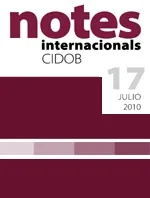A waning rotating presidency: The difficult role of Spain

Notes internacionals CIDOB, núm. 17
The best conclusion of any assessment of the external action of the last Spanish presidency of the European Union in 2010 is that no assessment is possible. In other words, the governmental army that was preparing an EU international relations agenda for the half-yearly presidency along with the academic analysis evaluating its progress each six months has become obsolete. The foreign policy of the European Union is no longer constructed on a six-monthly basis. It makes no sense any more to assess it at this tempo. The assessment should be longer-term and probably in keeping with the five-year legislatures of the Commission and the Parliament. Moreover, the Lisbon Treaty has not resolved the matter of a single external representation. The European Union remains immersed in internal debate on the new hierarchy of powers and, in this context, the new half-yearly presidencies, obliged to “take the back seat”, in the words of a Belgian diplomat, are bereft of the visibility and political leadership they formerly enjoyed.
For Spain, occupying the half-yearly presidency had represented, on the three prior occasions, the zenith of its Europeanist expression, besides providing the occasion for giving impetus to Spanish priorities on the European agenda. This same goal was present in the preparations for the fourth Spanish presidency. José Luis Rodríguez Zapatero announced that the Spanish six-month term was not going to be a mere formality but that it was being approached as something transformative and with a very ambitious agenda. Maybe it was too much for a country already debilitated in the eyes of its European partners because of its economic indicators, and one that was faced with an as-yet untried European institutional machinery working in slow motion during the first months.
The Spanish presidency of the EU has not had it easy. Adjusting to the new institutional system and the difficulties intrinsic to the European Union, which has not yet found a foothold in the new international setting, have also had their influence in the last European half-year period.
(...)